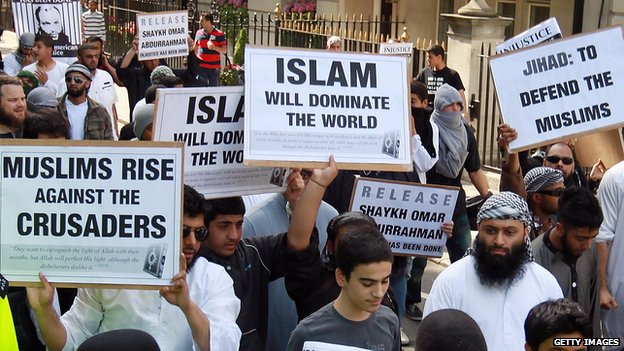Radical Islam is a historical, socioeconomic, political, and cultural movement that regards Islam as a complete religion, a revolutionary ideology in terms of politics, and a state. It refers to a state of mind that allows for activities that attempt to forcefully disrupt and alter the existing state of affairs into a utopian state of faith and equality, for any purpose.[1] As a result, these terms are inextricably linked to complete change, or ripping down and ruining a system from its roots up through Jihad or violence, and substituting it with an alternate Islamic system predicated on Islamic Sharia laws, and using the Qur’an and Prophetic belief systems (sunnah) as contextual constructs.
The spread of radical Islamism across the Middle East and abroad has created considerable disruption of politics in the directly impacted countries, as well as placing political Islam at the top of Western governments’ concerns, particularly the U.S.[2] Nevertheless, this renewed focus has only served to reinforce the negative perceptions about Muslims that already exist in the West. Despite the fact that the overwhelming majority of Muslims around the world are opposed to terrorist activities, religious fanaticism, and women’s oppression, these are the most common representations of Islam Iman (faith) in the Western culture.
Much has been expressed about “Islamist terrorism” since the September 11, 2001 attacks by the Wahhabi Islamist terrorist group al-Qaeda against the U.S., claiming that it is a distortion that has “compromised Islam” in the interest of societal, political, and economical issues.[3] Such arguments, nevertheless, do not clarify why other individuals with identical or more severe concerns have not established similarly destructive religious terrorist ideologies. Furthermore, most terrorists have admitted to having religious motivations and believing that they act in accord with Islamic ideals.
Radical Islam is made up of a variety of movements, groups, and organizations that share some commonalities but may hold quite divergent ideological and strategic viewpoints. The many manifestations of modern radical Islam have a historical and social genesis in essence. Many movements, organizations, and groups share a discontent with and opposition to the Western world’s political, economic, and cultural domination, which is held by many Muslims worldwide. The diversity found in today’s extreme Islam can be traced back to differing perspectives on “the evil of Western oppression of Islam” and alternative options.[4]
One of the types of radical Islam emphasizes opposition to Western political and, by extension, economic subjugation. The emphasis is on the West’s political influence. This power ought to be dissolved and substituted with Islamic political power. The Islamization of political systems in Islamic countries is an initial step towards that direction. The end goal, on the other hand, is even more aggressive: the construction of a global Islamic state and an Islamic world community (Ummah) capable of conquering the West. This form of radical Islam is known as radical-political Islam since it focuses on the political aspect of Western subjugation and the intended political alternate solution.[5] As a result, this category includes the violent and non-violent types of radical Islam that seek a political system predicated on their own Islam ideology, based on rejection of the Western democratic governance system, or an in-part non-acceptance of important components of such a system. This kind of radical Islam is also known as radical caliphatism.
Another form of radical Islam focuses on opposition to cultural domination by the West. The emphasis is on the ‘baneful’ Western way of life, which is seen as a challenge to ‘pure Islam.’ Extremist-Islamic puritanism is a term used to characterize this form of radical Islam. Its adherents despise the way human relationships are shaped in Western civilization. They disdain Western ideals on equal rights between men and women, particularly the right of women to engage in public affairs on an equivalent basis with men; freedom of expression; ideological pluralism, privacy autonomy; secularism; and so on. They advocate a social order predicated on Islamic ‘morals’ as laid forth in the Sharia as an alternate solution to the ‘repulsive’ Western civilization.[6]. This extremist-Islamic puritanism may be found today in movements like ‘Salafism’ and ‘Wahabism,’ which strongly focus on the ‘purification’ of Islam from heresy.[7] The main goal is to re-Islamize Muslims who have been influenced by non-Islamic forces. Exclusionism, or the teaching of religious and cultural prejudice, and parallelism, or the partial or total opposition to non-Islamic political institutions and the pursuit of independent Sharia territories, are frequently associated with re-Islamization efforts.
Moreover, another form of Islam Radicalism retaliates against both the political and social oppression of the West, although less strictly driven by religion in the intended alternate solution. This kind of Islam Radicalism can be characterized as radical Muslim nationalism. It includes the regularly disregarded types of radicalism which center not actually around Islam as a religion, but instead on being a Muslim. An example of radical Muslim nationalism is the Arabic European League. [8] Muslim nationalism shares some characteristics with radical-political Islam, which aims to emancipate Muslims, and radical-Islamic puritanism, which has inclinations to exclusivism and parallelism, albeit it is much less radical and driven by religion.
In conclusion, Radical Islam is a controversial term with several definitions ranging from scholarly interpretations to the belief that all other ideologies have ended in failure and are less superior than Islam. Terrorism is commonly associated with radical Islam. Terrorism is suspected in the case of a radical Muslim. As a result, a Muslim is assumed to be at the very least a possible terrorist. Radicalization of Muslims and Islamic organizations in the West and throughout the Islamic countries has bred a modern wave of Islamist activism, most of which is determined to use violence to accomplish their goals.







